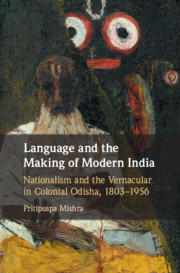Refine search
Actions for selected content:
2 results
6 - The Genius of India: Linguistic Difference, Regionalism, and the Indian Nation
-
- Book:
- Language and the Making of Modern India
- Published online:
- 02 January 2020
- Print publication:
- 16 January 2020, pp 198-225
-
- Chapter
-
- You have access
- Open access
- HTML
- Export citation

Language and the Making of Modern India
- Nationalism and the Vernacular in Colonial Odisha, 1803–1956
-
- Published online:
- 02 January 2020
- Print publication:
- 16 January 2020
-
- Book
-
- You have access
- Open access
- Export citation
